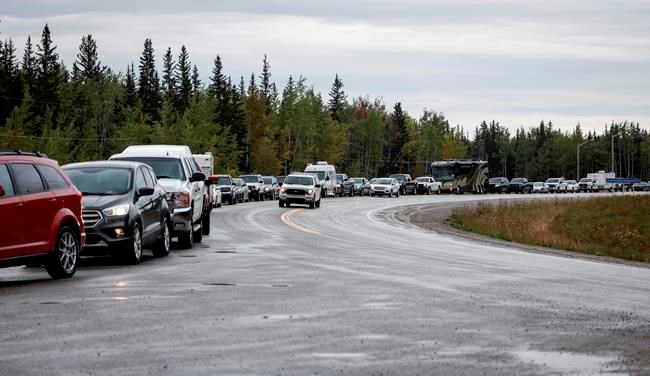YELLOWKNIFE — Angela Canning rushed to the highway Wednesday morning to wave at the stream of vehicles heading back to Yellowknife as an evacuation order was lifted three weeks after a nearby wildfire forced the city's 20,000 residents out of their homes.
"I'm very excited to have life come back to the city," said the lifelong resident.
The order for the capital of the Northwest Territories, which also included the First Nation communities of Dettah and N’Dilo, was downgraded Wednesday to an evacuation alert. The fire was considered held, meaning it wasn't expected to grow under current conditions.
Yellowknife Mayor Rebecca Alty posted on social media that she requested the order be lifted at 11 a.m., an hour earlier than planned.
“Safe travels home today,” Alty said.
A giant banner with "welcome home" was put up at the road entering Yellowknife to greet the thousands of vehicles that are expected to travel back to the city in the coming days.
Canning said she joined others by the sign to cheer on the first vehicles that drove into the community after the order was lifted. There was honking and waving as the drive-by celebration marked a step toward normal life.
Canning knows the relief of returning home. She stayed in a camping trailer for 17 days in Fort Providence, southwest of Yellowknife. She was able to return over the weekend because her husband is an essential worker.
"I don't know if I'll ever want to go camping again," she said.
Tens of thousands of people were forced to flee by road and air when the evacuation order came into effect Aug. 16 due to an encroaching wildfire.
Evacuee Kelsey Worth packed up her children, two cats and dog and drove to Alberta — first to Calgary, then High River, before settling in the hamlet of Cayley.
She plans to pick up groceries and other items before beginning the long drive north Thursday.
Worth said she doesn’t have to be back at work until Monday and is waiting an extra day so as not to clog up the highway with more traffic.
“We've got a few extra days where we can take it a little slower,” she said.
Government officials have said they are making plans to keep the highway safe for those returning. They are also ensuring there are places for people to get fuel.
Caravans of vehicles lined up at the Big River Service Station in Fort Providence throughout the day. Linda Croft, the general manager, said she brought in extra staff to help direct traffic through the gas pumps.
Croft said spirits have been extremely high, because people know that once they are at the station they've nearly finished the journey.
"I think everybody is excited to return home," she said.
Croft said she, too, is ready for life to get back to normal. While the gas station is out of the area of fire risk, the blazes have made it difficult to get supplies.
"It's been a logistical nightmare," she said.
Groceries have made their way north in recent days in preparation for the return of residents. The Yellowknife Co-op said its shelves are stocked.
The city said its solid waste facility is to open Thursday and garbage pickup is also to start that day.
Residents have been advised to prepare to be self-reliant for 72 hours upon their return.
Most people left Yellowknife by road, but thousands also took flights with destinations in British Columbia, Alberta and Manitoba.
The first flight back to the territorial capital arrived Wednesday morning.
The territory's Emergency Management Organization has said more than 2,000 people have registered for re-entry flights.
For those who stayed in the territorial capital, it was a welcome relief to see the faces of essential workers who began returning over the last few days.
“It’s been very tough days, long days — and not just for people on the ground, but evacuees who have been separated from their homes and families and friends," said Kieron Testart, who works with Yellowknives Dene First Nation emergency operations.
Testart said people returning to Yellowknife will likely feel relieved, but there are others elsewhere in the territory who still can’t go back. Thousands of people living in Hay River and Fort Smith, who were ordered out days before Yellowknife, remain displaced from their homes.
“There are many northerners … who aren’t coming home,” Testart said.
“We can’t forget about them, too. It’s truly devastating.”
This report by The Canadian Press was first published Sept. 6, 2023.
— By Kelly Geraldine Malone in Saskatoon
The Canadian Press



